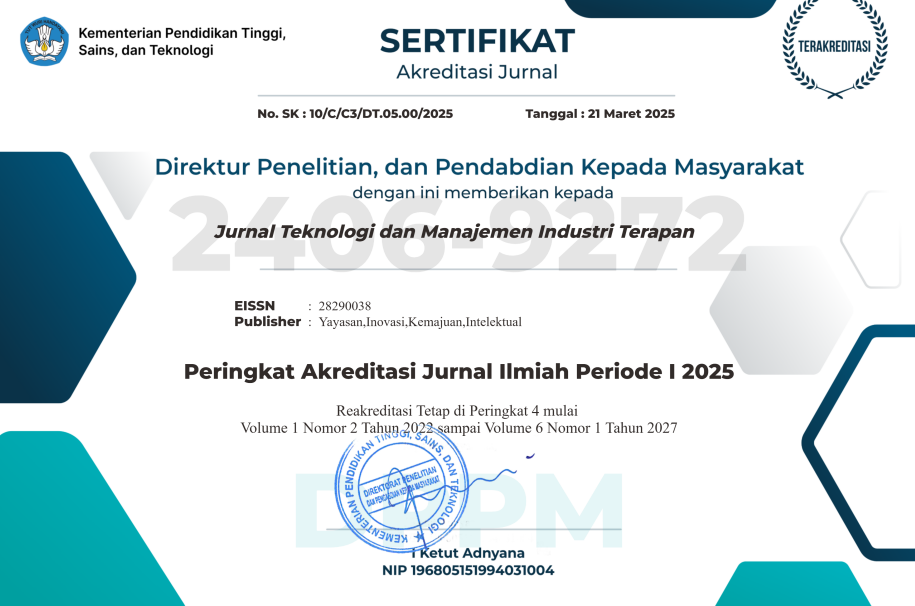Good Corporate Governance As A Moderating Variable Of The Influence Of Green Accounting Variables On Environmental Performance
DOI:
https://doi.org/10.55826/jtmit.v4iI.916Keywords:
Good Corporate Governance, Green Accounting, Environmental PerformanceAbstract
This research is a quantitative study with an explanatory approach, which uses the three studies mentioned above as a fundamental basis for creating hypotheses, building hypotheses accompanied by arguments, and testing the hypotheses. Research data is needed to confirm the hypothesis. The research data used in this article is primary data that researchers obtained from ten environmental managers at BUMN companies under Rajwali Nusantra Indonesia. The data obtained by the researcher contains ten questions, including four questions about Green Accounting, four about Environmental Performance, and two about Good Corporate Governance. The data obtained by the researcher was analyzed using the smart PLS 4.0 analysis tool. The results in this article show that all hypotheses in this study can be accepted and proven. In the first hypothesis in this study, the Green Accounting variable can have a positive relationship direction and a significant influence on Environmental Performance. This is because the P-value is positive and is below the significance level of 0.05, namely 0.003. These results mean that the better the Green Accounting is, the more funds a company can save on environmental expenditures, such as environmental accidents, and so on. This can improve Environmental Performance. In the following hypothesis, the Good Corporate Governance variable can also strengthen the influence of the Green Accounting variable on Environmental Performance. The same thing indicates this: the P-value in the second column is positive and below the significance level of 0.05, namely 0.000.
References
Y. I. Windarto, “Tinjauan Pidana Penyalah Gunaan Wewenang Dalam Pelaksanaan Peraturan Daerah Oleh Ekskutif,” Front. Neurosci., vol. 14, no. 1, pp. 1–13, 2021.
J. Handoko and V. Santoso, “Pengaruh Akuntansi Hijau dan Kinerja Lingkungan terhadap Kinerja Keuangan dengan Tanggung Jawab Sosial sebagai Pemediasi,” Nominal Barom. Ris. Akunt. dan Manaj., vol. 12, no. 1, pp. 84–101, 2023, doi: 10.21831/nominal.v12i1.56571.
H. Zulhaimi, “Pengaruh Penerapan Green Accounting Terhadap Kinerja Perusahaan (Studi Pada Perusahaan Peraih Penghargaan Industri Hijau Yang Listing Di BEI),” J. Ris. Akunt. dan Keuang., vol. 3, no. 1, pp. 603–616, 2015.
A. P. Egbunike, “Does green accounting matter to the profitability of firms? A canonical assessment,” Ekon. horizonti, vol. 20, no. 1, pp. 17–26, 2018.
W. F. Ningsih, “Implementasi Green Accounting Dalam meningkatkan kinerja perusahaan,” J. Appl. Bus. Econ., vol. 4, no. 2, pp. 149–158, 2017.
D. Mariani, “Pengaruh Penerapan Green Accounting, Kepemilikan Saham Publik, Publikasi CSR Terhadap Pengungkapan CSR Dengan Kinerja Keuangan Sebagai Variabel Intervening (Studi Empiris pada Perusahaan Property dan Real Estate yang Terdaftar di Bursa Efek Indonesia Tah),” J. Akunt. Dan Keuang., vol. 6, no. 2, pp. 141–160, 2017.
A. Ikhsan, Akuntansi Manajemen Lingkungan. Yogyakarta: Graha Ilmu, 2009.
D. Winda Meidina and dan S. Netty Laura, “The Effect of Employees’ Mental Health on Performance Mediated by Welfare in the Workplace (Empirical Study on Information Technology Division Employees During Work From Home,” Bus. Manag. J., vol. 18, no. 1, pp. 85–105, 2022, doi: 10.30813/bmj.
W. Utami, “Kajian Empiris Hubungan Kinerja Lingkungan, Kinerja Keuangan dan Kinerja Pasar: Model Persamaan Struktura,” Universitas Indonesia, 2007.
B. . Spicer, “Investors, Corporate Social Performance and Information Disclosure: an Empirical Study,” Account. Rev., vol. 53, no. 1, p. 94, 1978.
M. Russo, “A Resource Based Perspective on Corporate Environmental Performance and Profitability,” Acad. Manag. J., vol. 40, no. 1, p. 539, 1990.
N. Rustika, “Analisis Pengaruh Penerapan Akuntansi Manajemen Lingkungan dan Strategi terhadap Inovasi Perusahaan (Studi Empiris Pada Perusahaan Manufaktur Yang Terdapat Di Jawa Tengah),” UNDIP, 2011.
S. Musyarofah, “Analisis Penerapan Green Accounting di Kota Semarang,” Universitas Negeri Semarang, 2013.
Wardah, “Analisis Pengaruh Penerapan Green Accounting Terhadap Profitabilitas Perusahaan Manufaktur yang Terdaftar di Bursa Efek Indonesia,” Universitas Gunadarma, 2015.
S. D. G. P. SARI, “PENGARUH PENERAPAN AKUNTANSI LINGKUNGAN TERHADAP KINERJA LINGKUNGAN PADA PTPN XIV PABRIK GULA TAKALAR,” Emerald, 2021. doi: 10.1108/jed-04-2020-0036.
W. D. Widiastuti, “PENGARUH GREEN ACCOUNTING DAN PROFITABILITAS TERHADAP KINERJA LINGKUNGAN PADA PERUSAHAAN MANUFAKTUR TAHUN 2019-2021,” Universitas Islam Sultan Agung, 2022.
N. R. Maharani, “PENGARUH KOMPETENSI DAN MOTIVASI KERJA TERHADAP KINERJA KARYAWAN ( Studi Kasus Karyawan PT. Midi Utama Indonesia,Tbk ),” UNIVERSITAS ISLAM NEGERI SYARIF HIDAYATULLAH JAKARTA, 2021.
Jonathan Sarwono, Meode Penelitian Kualitatif dan Kuantitatif. Bandung: Graha Ilmu, 2016.
Hasan, Pokok-pokok Materi Metodologi Penelitian dan Aplikasinya. Jakarta: Ghalia Indonesia, 2002.
C. N. Ardianto, “Nilai Perusahaan : Pengaruh Profitabilitas Dan Good Corporate Governance,” J. Ilm. Manajemen, Ekon. Akunt., vol. 7, no. 2, pp. 1087–1106, 2023, doi: 10.31955/mea.v7i2.3118.
R. Nuraeni et al., “Pengaruh Komunikasi Interpersonal Terhadap Kinerja Karyawan,” Diponegoro J. Account., vol. 2, no. 1, pp. 2–6, 2017, [Online]. Available: http://i-lib.ugm.ac.id/jurnal/download.php?dataId=2227%0A???%0Ahttps://ejournal.unisba.ac.id/index.php/kajian_akuntansi/article/view/3307%0Ahttp://publicacoes.cardiol.br/portal/ijcs/portugues/2018/v3103/pdf/3103009.pdf%0Ahttp://www.scielo.org.co/scielo.ph
A. DEWANTORO, “PENGARUH SHOPPING LIFESTYLE, DISCOUNT DAN FASHION INVOLVEMENT TERHADAP IMPULSE BUYING PADA ONLINE SHOP LAZADA.CO.ID (Studi Kasus Pada Mahasiswa FEB Unisma),” 2020.
Iskandy Wijaya, “PENGARUH FINANCIAL KNOWLEDGE, FINANCIAL SATISFACTION, FINANCIAL CONFIDENCE TERHADAP FINANCIAL BEHAVIOR,” Corp. Gov., vol. 10, no. 1, pp. 54–75, 2020.
W. Zarkasyi, Good corporate governance pada badan usaha manufaktur, perbankan, dan jasa keuangan lainnya. Bandung: Alfabeta, 2008.
Hair, Multivariate Data analysis, Seventh Editions. Prentice Hall: New Jersey, 2010.
I. Ghozali, Aplikasi analisis multivariete dengan program (IBM. SPSS). Diponergoro: Univrsitas Dipenogoro, 2016.
M. Sarstedt, C. M. Ringle, D. Smith, R. Reams, and J. F. Hair Jr, “Partial least squares structural equation modeling (PLS-SEM): A useful tool for family business researchers,” J. Fam. Bus. Strateg., vol. 5, no. 1, pp. 105–115, Mar. 2014.
Downloads
Published
Issue
Section
License
Copyright (c) 2025 Kusiyah, Rieneke Ryke Kalalo, Arifia Nurriqli, Loso Judijanto, Mega Arisia Dewi

This work is licensed under a Creative Commons Attribution-NonCommercial-ShareAlike 4.0 International License.


















